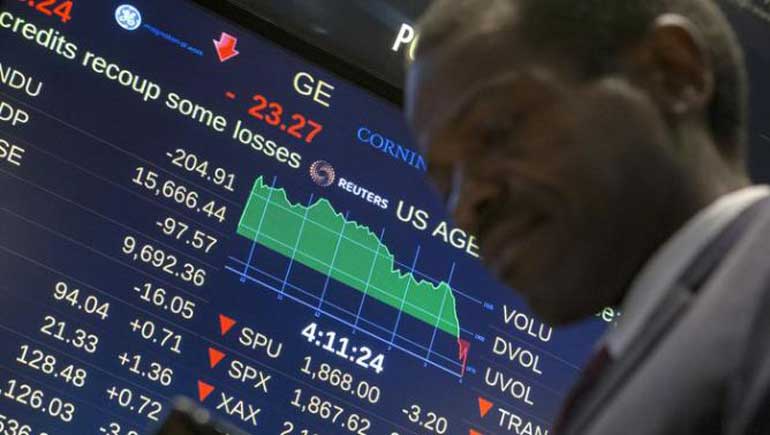Tuesday Mar 03, 2026
Tuesday Mar 03, 2026
Thursday, 27 August 2015 00:00 - - {{hitsCtrl.values.hits}}

World shares sagged on Wednesday as investors feared fresh rate cuts in China may not be enough to stabilise its slowing economy or halt a stocks collapse that is wreaking havoc in global markets.
Europe’s main stock markets, which had surged on Tuesday after China’s moves, reopened 2% down as the jittery mood returned and sent investors back into safe-haven German and US government bonds.
China’s key share indexes had attempted to move higher several times during Asian trading only to be slapped back by waves of selling, reflecting investors’ views that much more support was needed from the government and the central bank.
Despite a late struggle, the CSI300 index closed down 0.6% and the Shanghai Composite Index ended off 1.3% for fifth straight day in the red.
It followed on from a jarring finish on Wall Street where the S&P 500 slumped more than 3% in the last hour.
The CBOE Market Volatility Index was still elevated at 36 on Wednesday, indicating significant uncertainty, even though the “fear index” as it is known was below the previous day’s 6-1/2 year peak of 53.3.
“The root of this is concern that growth in China may be a lot lower than what the market had thought,” said Michael Bolliger, head of emerging market asset allocation at UBS Wealth Management in Zurich.
“They made further announcements yesterday but the market does not appear fully convinced, it has not distracted people from the fears about the economy.”
There was more choppiness in currencies, with the dollar beginning to lose steam again in Europe having been on front foot for most of the Asian session.
The euro, which has taken on somewhat of a safe-haven status during the recent volatility, briefly turned higher on the day, rising to $1.1515. The dollar also dipped back to 119.35 yen, having been at 119.83 yen in early deals.
Fixed income markets were active with investors back in the mood for safety in government debt and cash. The yield on benchmark U.S. 10-year Treasuries eased to 2.0854% from 2.091% in late U.S. trade. It was close to 2.50% barely a month ago.
China’s downturn and global market turmoil have also created fresh uncertainty over whether the U.S. Federal Reserve will begin raising interest rates this year.
German 10-year bond yields -- the euro zone benchmark -- also dropped 5 basis to back below 0.70%, though that was still a way away from Monday’s 0.51% lows when the China fears had coursed through markets.
“Some parts of the Asian bond markets have become quite illiquid and investors are only buying high-quality paper amid this selloff,” said Hayden Briscoe, fixed-income director at AllianceBernstein in Hong Kong.
Despite China’s struggles, Asia had shown some signs of stabilisation after its recent lurches.
Japan’s Nikkei and Korea’s KOPSI were among the bright spots, with the former rising 3.2% as the dollar pushed down the yen. The latter jumped 2.6% in its biggest jump in two years.
Commodity prices which have been firmly in the China firing line, hovered just above multi-year lows hit earlier in the week.
The price of copper, often considered a proxy for global economic activity because of the metal’s extensive use, dropped back 1.8% to $5,065 per ton after a bounce on Tuesday.
A fall in a host of other industrial metals also kept the 19-commodity Thomson Reuters/Core Commodity CRB Index close to lows not seen since 2003.
Oil was bucking the trend. Brent crude futures last traded at $43.50 per barrel, more than a dollar above 6 1/2-year low of $42.23 on Monday. US crude also ticked up to 39.55.
Gold, meanwhile, was one of the few traditional safe-haven assets to lose ground, as it dipped 0.3% at $1,136 an ounce.
There is no basis for continued depreciation in the Chinese yuan, Premier Li Keqiang was quoted by state television as saying on Tuesday.
“Currently, there is no basis for continued depreciation in the renminbi (yuan), which is able to stay at a reasonable and balanced level,” Li said.
China’s economic fundamentals had not changed and the government could achieve its main economic targets for the year, he added.
The central bank shocked global markets by devaluing the yuan by nearly 2% on 11 August. The PBOC called it a free-market reform but some saw it as the start of a long-term yuan depreciation to spur exports.